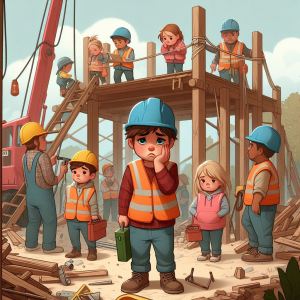
As a playworker, has anyone ever asked you if you get paid for what you do? Have people assumed that you are a volunteer? Have they watched you doing all the things that being a playworker entails (often in some of the most dynamic and volatile circumstances) and still been shocked when they realise it’s your job? Why is that?

Is it because we (as a society) don’t value childhood? I mean, we value people-in-waiting. Citizens-in-the-making. Economy-drivers of the future. But, do we really value what it is to be a child? Why it’s important to be a child?
And/or is it because we don’t value play? It’s considered frivolous. A luxury. But, “play is not a nice to have, [or] a maybe tomorrow” (as Matthew Rhys Evans says in Play Wales’s This is why play is so important film), it’s a necessity.

Of course, we – as playworkers – know that. The problem is that the rest of the world does not. Even some (emphasis on *some*) of our closest comrades – like early years workers, youth workers etc – don’t quite understand the distinct role playworkers play in keeping interfering adults away from the intimate realms where children’s minds commune with the physical world through play.
It’s our constant battle: To communicate the tricksy duality of play as simplistically complicated, yet simultaneously perplexingly plain.

From my own experience, youth workers don’t seem to have the same difficulty in communicating or demonstrating what they do, nor for the value of their role to be recognised by authorities and the community. Perhaps theirs is a little more obvious: they’re dealing with troublesome teenagers smashing bottles and smoking weed on the skate park – “That’s hard work, that – chwarae teg”. Whereas playworkers… “well, you lot just build sandcastles and roast marshmallows, right?” – right… 🙄
The benefits, impacts, and outcomes of enabling children’s play is one of speculation. There is no guarantee of return on investment. And, any dividends will be paid long-after the playworker has left the lives of the once-children/now-adults, which – in a capitalist system at least – makes it a hard sell for society to value in-the-now.

But is that the difference? Much of what youth workers do is playwork (to some extent), and vice-versa. As has been demonstrated at many workshops at the National Playwork conference in England, there is often very little that divides what we do either as playworkers or youth workers (or both) when working with young people.
But, there is a distinction. Just as there is a distinction between the “physical activity” that we see when children are involved in self-directed locomotor play, and the “movement” that might be described by sport practitioners. They are different. And, that’s ok. But sport and youth work have something we don’t… and it’s something that is being mooted as a potential way for playwork to finally receive the recognition it deserves.

That something is professional registration. What does that mean? And why is it of potential use?
Generally, a professional register is a list of maintained by a recognised professional body that includes the names of individuals who have met certain criteria. These criteria will typically be clarification that a practitioner has:
- training, education, or experience of a particular level and/or standard (that is recognised by the government of the nation in which they work);
- completed other mandatory training (e.g. safeguarding and Prevent Duty);
- (if relevant) a valid enhanced criminal records check to enable them to work with children and/or vulnerable adults (e.g. DBS check in England and Wales, Enhanced Disclosure in Scotland, or AccessNI Check in Northern Ireland);
- committed to adhere to a Code of Conduct;
- committed to Continuous Professional Development (CPD).
The purpose? Very briefly, it is generally thought that professional registration brings greater professional recognition, elevated professional standards, and better employment terms and conditions.
Across Great Britain, there has been lively debate on the matter since last year, but the conversation is reaching a particular crescendo in Wales as the Welsh Government consultation on the Professional registration of the childcare and playwork workforce draws closer to its deadline of 7th March 2024 (a week today!).
The consultation was announced on 30th November 2023 by Deputy Minister for Social Services, Julie Morgan MS, and described as “an opportunity for those managing, working, and using childcare and playwork settings across Wales to tell us what they think about the principle of professional registration and whether they feel a workforce register would be beneficial for the childcare and playwork sector now or in the future”.

What’s not to like?
Some discussions have highlighted concerns that could have a negative impact on the playwork workforce:
- It will cost – estimated figures put registration around the £65-100 mark to be covered by playworkers themselves. In the past, when DBS costs have been passed-on to playworkers, it can negatively impacted recruitment.
- It might cost even more – Youth Workers in Wales already have to be registered with the Education Workforce Council (EWC) in order to practice, with a baseline fee of at least £45 per year. Many teaching and youth work staff already feel this lacks value for money. It’s unlikely (but not impossible) that playworkers and youth workers will share a professional register, meaning those who practice playwork and youth work may have to pay twice.
- Registered settings only? – It has been suggested that professional registration might only apply to those settings which have to register with Care Inspectorate Wales (CIW). At present, there are loopholes / exemptions that avoid the requirement to register with CIW (e.g. not open for more than 2 hours a day; not open more than 5 days a year). To avoid increased costs or to retain staff, providers may choose to use these loopholes more – this would counter the narrative of improving quality, and even increase the likelihood of safeguarding concerns.
- “P3 or not P3? That is the question” – Which qualifications might the professional register recognise? What about playworkers moving to or working in Wales from elsewhere? What about those seasoned playworkers who have no qualifications? Which leads us on to one of principle…
- Who decides? – Whether it’s recognition of previous experience or learning, or fitness to practice… who decides what is good enough?

Contemporary playworkers share their heritage with the adventure playground movement that first took seed in the Blitzed rubble of London in 1946. Grassroots community members – parents, carers, siblings, neighbours, councillors, shopkeepers – protecting spaces for children to play. 80 years later, how would they have stacked-up against a professional register? Is that still relevant?
In the 1970s and 80s – with the emergence of workplace health and safety legislation, and inspection and registration requirements – adventure playgrounds faced existential crises. Comply or close was often the reality. So, playwork practice changed. Then, in the late 00s, a change of Government in Westminster and an accompanying financial crash led to more adventure playgrounds being lost to the history books (and the housing developers).

Born in 1987, all of this I know from articles, books, and offensive-language-strewn YouTube videos about the early days of adventure playgrounds. But, my guess is that this prospect of professional registration is potentially what it might have felt like in the 70s and 80s on those OG APs [that’s “original gangster adventure playgrounds” for those of you even more ancient than I].
The Health & Safety at Work etc Act 1974 was an inarguable positive step for workers rights and public safety, but it must have been heart-breaking to watch the towers, high beams, and trampolines all be dismantled and discarded, never to return, as a result. But what if playwork had refused to change? Would it have survived to today?

Playwork is under threat. Whether it’s Forest Schools incorporating “playwork” into their practice whilst also fulfilling the Forest School Principles, sports bodies broadening and diversifying the definition of “physical activity” and “movement” to access funding, or the allure of education and structured activities in youth work provision for children aged 11 – 18, playwork is struggling to cut-through the noise.
Could professional registration elevate the perception of playworkers?
Is it just a question of timing?

Play Wales are encouraging playworkers, managers, and those working in the playwork sector to respond to the consultation, and have also published their own draft response to help people in doing so.
Another consultation with a slightly shorter deadline (TODAY) is Future spending purposes for dormant assets funding in Wales. Welsh Government is seeking views on how dormant assets could be used to improve the lives of people in Wales. Section 3.4 of the consultation specifically discusses the option of using funds to address barriers to children’s play and leisure activities.
This article was written by Siôn Edwards (Chair of The Playwork Foundation), and these statements represent his own views and do not necessarily reflect those of The Playwork Foundation.
